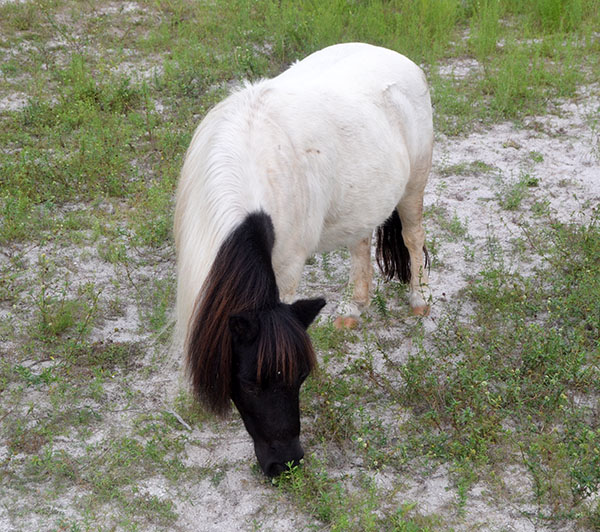
In 2011, Nora Janssen launched Karen’s Equine Intervention to honor her daughter, Karen, who passed away following complications from a car accident.
“That’s the sad part,” Janssen said. “The good part is using the animals to help people.”
Janssen — a retired nurse — was inspired to start the program to help people after witnessing first-hand the positive impact animals had treating her daughter’s post-accident depression.
“She was a bright, beautiful, intelligent animal lover,” Janssen said. “Anyone who has a chronic illness has a concurrent depression.”
Among the animals found within the 2.5-acre property in Loxahatchee’s Royal Ascot Estates are retired Thoroughbreds Koda — a 13-year-old tricolor paint — and Flicka — a 27-year-old appendix. There are a pair of miniature horses named Mali — a 15-year-old miniature paint — and Macaroon or “Mac” — an eight-year-old leopard appaloosa miniature.
The barnyard area has a diverse cast, ranging from a two-year-old Vietnamese potbelly pig named Charlize to a six-year-old Nigerian dwarf goat named Rosa.
Surrounding them are at least a dozen endangered Royal Palm turkeys and more than 50 chickens. Some of the chickens are as old as 15, which is unusual, as many chickens are slaughtered after becoming non-productive in terms of egg laying.
Janssen started the program with her husband, John Clark, who has since passed away, but she is still assisted by her son, Pete Janssen. The mother-and-son pair rely on volunteers for events, fundraising and community activities they are invited to take part in. “We always need volunteers,” Janssen said.
In addition to adults, the program also accepts teenage volunteers with parental permission. Karen’s Equine Intervention works with local schools such as Wellington High School and the King’s Academy to offer equine internships.
Eight to 10 clients cycle through the program at a given time. Many of the adults have ailments such as depression, anxiety or post-traumatic stress disorder (PTSD). The children who come by typically are on the autism spectrum or have behavioral issues.
“It doesn’t matter what their problem is,” Janssen explained. “If I think I can help, I take them on an individual basis.”
Many of the sessions that clients experience are private one-on-one visits due to their anxiety.
Another group of clients are those individuals who have suffered riding accidents and have developed anxiety about riding.
The work Janssen has done with Karen’s Equine Intervention has resulted in recognition from U.S. Rep. Alcee Hastings, whose 20th congressional district represents the area. Betwixt the equine paperwork of Koda and Flicka is a proclamation from Hastings honoring the program.
For the past two holiday seasons, the program has played host to a memorable Christmas event. The third annual Karen’s Christmas Barnyard will be held on Saturday, Dec. 8 at 1 p.m. The event features face painting, pony rides, old-fashioned games and a silent auction. Local merchants make donations, but sponsorship opportunities are still available. The event is free for disadvantaged children, but a donation of $25 is requested from those who can afford it.
Operating as a nonprofit, Karen’s Equine Intervention often has to raise money when particular needs arise. At the moment, the program has two costly needs.
Mali is currently suffering from a collapsed trachea (windpipe), which is more prevalent in miniature horses.
“I discovered it after she went into respiratory distress after being chased by Koda,” Janssen explained. “The veterinarians aren’t sure what caused it. The shortest bit of exercise causes respiratory distress.”
A veterinarian has placed Mali on a bronchodilator, but it is a short-term solution. Ultimately, a costly surgical procedure is needed. The surgery would involve placing a stent to open up the trachea. The condition is known to worsen as the horse ages.
“The goal is to have the surgery in the winter,” Janssen said. “I do not believe she would survive in the trailer in the Florida heat if we attempted to transport her this time of year.”
During feeding time, effort is made to soak Mali’s hay to ensure maximum comfort when eating due to the discomfort caused by her condition.
The second problem facing the facility is the result of a volunteer attempting to help, but instead causing thousands of dollars in damage.
The volunteer attached a harrow to the rear of his truck and attempted to harrow the arena in wet conditions. Instead of turning over the sand neatly, it destroyed the entire surface of the arena.
Further complicating the matter was the fact that they did not replace the retention wood after the process, and several truckloads of dirt were washed away. Where there was once a pristine riding area, there is now an uneven surface where weeds have taken hold.
In order to bring the arena up to usability standards by the start of the season, Janssen is seeking material donations, including sand, concrete screenings, microfiber and cut-up rubber.
For more information about Karen’s Equine Intervention, including how to donate or volunteer, visit www.equineintervention.org or call Janssen at (561) 847-6202.







